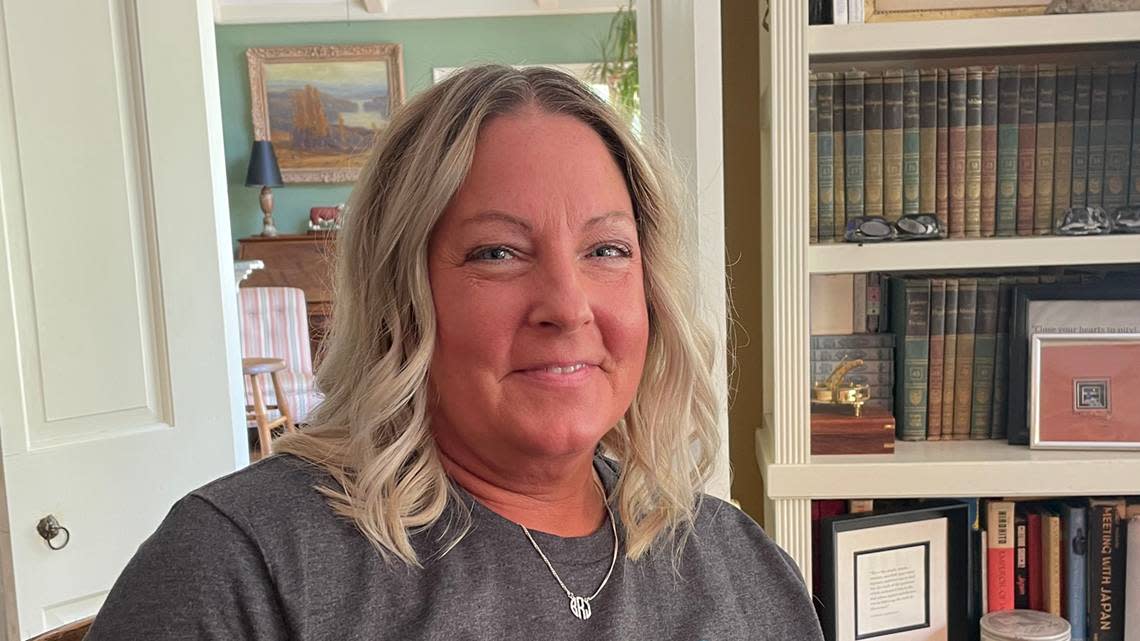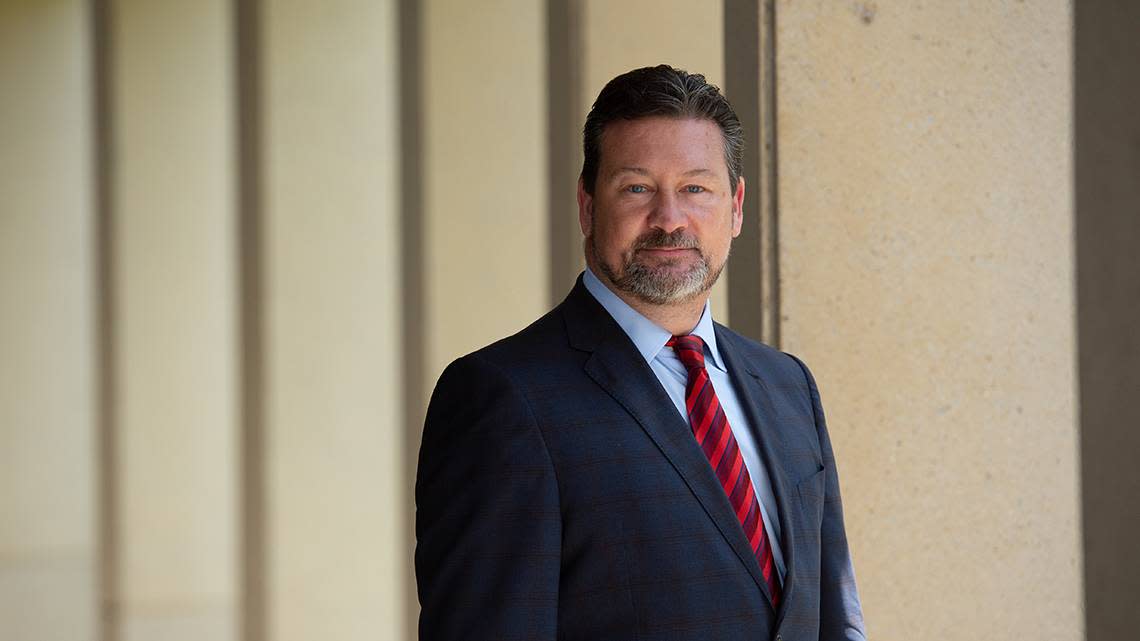Douglas County DA has been a big disappointment, and yet I’m taking up for her? Sort of | Opinion
Douglas County District Attorney Suzanne Valdez, whose unprofessional behavior towards the chief judge in her county provoked a humiliating three-day disciplinary hearing this week, has definitely been a big disappointment since taking office almost three years ago.
One of her worst sins, in my book, was when she reneged on her promises to the wildly over-sentenced Sarah Gonzales-McLinn, who was 19 when she killed her abuser.
Another was her irrational determination to retry Carrody Buchhorn, the Eudora day care worker wrongfully convicted of murder in the death of a child who actually died of natural causes. Even when Valdez finally had to drop that misguided effort, and acknowledged that she couldn’t win in court, she did so in a news release that referred to “other evidence to support prosecution.”
Now, though, that the attorney general’s office has named Valdez as a witness in the state’s effort to avoid compensating Buchhorn for the years she served in prison for something she didn’t do, Valdez’s position is that she doesn’t know enough about the case to testify. But she does know enough to defame Buchhorn?

Valdez actually filed a disciplinary complaint against Buchhorn’s defense attorney, William Skepnek, for answering my questions about the case, even though as the investigation that followed found, everything he told me was accurate.
She seems to take everything personally, sees enemies everywhere, and then in some cases makes that vision a reality. She regularly blames the out-to-get-her press for her problems, as she did again this week.
And yet I’m actually going to take up for her? Sort of.
Priorities of Kansas disciplinary office in Topeka
At least enough, that is, to say that I understand where Melody Brannon, the federal public defender for Kansas, is coming from in complaining that this week’s hearing made her wonder, not for the first time, about the priorities of the Kansas disciplinary office in Topeka, which only rarely holds prosecutors accountable for misconduct.
“I think a comparison is warranted: A prosecutor offends the sensibilities of the local bench, and has a three-day hearing where she is facing suspension of her law license. But when a multitude of federal prosecutors surreptitiously collect confidential attorney-client communications for years, then collude, hide, deny, and defy court orders, nothing is done?”
Brannon is referring to the finding that phone conversations and video footage of meetings between lawyers and their clients housed at a privately-run Leavenworth Detention Center were improperly obtained by prosecutors in the U.S. Attorney’s Office in Kansas City, Kansas. Attorney-client communications are protected from such incursions from law enforcement by the Sixth Amendment.
“One glaring difference,” Brannon said, between the chief judge who was disrespected by Valdez and “the victims of prosecutorial misconduct who I represent” is that the latter “are all poor, mostly disenfranchised, and often people of color. There is no sense of urgency to respond to them. We have been waiting more than 3 1/2 years for some substantive response from the Disciplinary Office. This is a very broken system.”
And one in which, she said, “it appears to be a much more serious offense to call a judge a liar on social media than to actually lie to a judge under oath about how people were prosecuted.”
Ideally, of course, the disciplinary office could and would handle both.
But I really don’t see why being weirdly reactive and rude to a judge is worse than, say, suborning perjury, as a judge found that Wyandotte County prosecutor Ed Brancart did to convict Pete Coones, who as a result served 12 years for a murder he did not commit. Coones died of cancer only 108 days after his release in 2020.
Yet the disciplinary office cleared Brancart, who finally left the attorney general’s office earlier this year.
The way some who testified in this week’s hearing described the office under Valdez’s predecessor, Charles Branson, made it sound like a lot shinier and prettier an operation than was ever the case.
Branson, let’s not forget, lost his reelection bid after trying to prosecute a woman for the crime of reporting that she’d been raped.

(The rape allegations themselves were never investigated, and police, according to their own testimony, quickly decided that she’d made a false report after seeing text messages in which she downplayed what was happening to a friend, while still intoxicated and while still in the situation. Her bruises and lacerations must have come from rough sex, they decided.)
A KU guest lecturer, however, was not charged by Branson’s office even after four women alleged that he’d sexually assaulted them.
Branson’s office was also the longtime home for problem prosecutor Amy McGowan, whose involvement in multiple wrongful convictions I don’t even have room to tell you about. Yet she was allowed to retire in peace, just as former Wyandotte County and federal prosecutor Terra Morehead recently was allowed to do after a similarly shameful career.
Many, myself included, hoped that Valdez would be an improvement over Branson. That there has been almost complete turnover in the office is not in itself a problem, since so much needed to change.
But as it turned out, Valdez just had different problems.
After disagreeing with Chief Judge James McCabria about how to return to in-person court proceedings during COVID-19, Valdez publicly accused him of lying about having consulted her. When he showed that well yes, he had communicated with her office, she texted him this message: “The only reason you commented is because I am a Hispanic female (in) a position of power.”
She also put out this public statement: “Unfortunately, this is yet another example of how an outspoken and honest woman is mischaracterized as untruthful by a male in power.” Then she posted that statement on her Facebook page, along with this message: “Women of the world- be prepared! If you are hardworking, outspoken, honest, AND in a position of authority, the INSECURE MAN will try to tear you down. Not me, says I!!”
There’s MORE, but you get the IDEA.
Federal judge’s opinion cited prosecutorial misconduct in KCK
Former state and federal prosecutor Mike Warner says that while he doesn’t condone Valdez’s behavior, he still can’t help thinking that it’s a lot more concerning that no one has suffered any consequences as the result of federal Judge Julie Robinson’s damning 188-page 2019 opinion in USA v. Black.
That decision followed a three-year court and special master investigation into federal prosecutorial practices within the Kansas U.S. Attorney’s Office, specifically the KCK branch. “Judge Robinson’s ultimate opinion documented multiple illegal Sixth amendment intrusions, perjury, obstruction of justice and probable destruction of evidence violations,” Warner said.
Yet “to date, the Kansas Attorney Disciplinary Administrator’s Office has not held a single prosecutor accountable nor published any detailed findings of fact for not doing so. The Black opinion outlined a complicated case of systemic, deeply embedded federal prosecutorial misconduct persisting for many years. So why have Kansas authorities done nothing?”
An alcoholic solo practitioner who abandons his practice is bound to be sanctioned, Warner said, while “a prosecutor who wrongfully convicts someone for murder, conceals exculpatory evidence, convinces witnesses to lie by threatening their family or children or sentences dozens of federal defendants to prison after secretly listening to numerous attorney-client calls” is not.
Obviously, none of this excuses Valdez’s unfortunate behavior towards the chief judge and others. Testimony this week that no judge wants to meet with her alone for fear of having their words twisted sounds about right.
But if the disciplinary office is not equipped for whatever reason to handle even more serious transgressions, the Kansas Supreme Court, which oversees the office, needs to figure out why, and do whatever it would take to change that.
